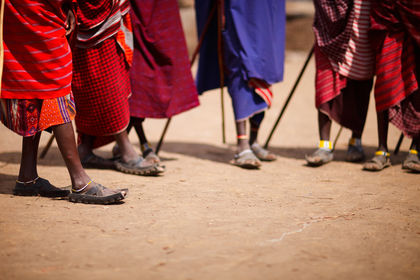Tanzania - Poverty and wealth

Although a small segment of Tanzanians with secure access to employment in the public and business sectors enjoy a relatively high standard of living, the vast majority of Tanzanians live in poverty. Indeed, the United Nations Development Programme 's (UNDP) human development index (HDI) listings, which arranges countries according to their overall level of human development, ranks Tanzania 156th out of a total of 174 nations. The HDI, a composite index (one that assesses more than one variable) that measures life expectancy at birth, adult literacy rate, school enrollment ratio, and GDP per capita , is indicative of a country's general social and economic well-being. As such, Tanzania's HDI ranking demonstrates that the country is one of the poorest and least developed in the world.
Under the socialist policies of Julius Nyerere, the Tanzanian government focused heavily on achieving social equity through the development of a strong health and education sector. Inequality in the early years of Ujamaa was mainly the result of the colonial legacy in which some peasants were connected to the cash crop export economy while others were not. Those that lived in areas favorable for cash crop production enjoyed a slightly higher standard of living than their subsistence peasant
| GDP per Capita (US$) | |||||
| Country | 1975 | 1980 | 1985 | 1990 | 1998 |
| Tanzania | N/A | N/A | N/A | 175 | 173 |
| United States | 19,364 | 21,529 | 23,200 | 25,363 | 29,683 |
| Dem. Rep. of Congo | 392 | 313 | 293 | 247 | 127 |
| Kenya | 301 | 337 | 320 | 355 | 334 |
| SOURCE: United Nations. Human Development Report 2000; Trends in human development and per capita income. | |||||
| Distribution of Income or Consumption by Percentage Share: Tanzania | |
| Lowest 10% | 2.8 |
| Lowest 20% | 6.8 |
| Second 20% | 11.0 |
| Third 20% | 15.1 |
| Fourth 20% | 21.6 |
| Highest 20% | 45.5 |
| Highest 10% | 30.1 |
| Survey year: 1993 | |
| Note: This information refers to expenditure shares by percentiles of the population and is ranked by per capita expenditure. | |
| SOURCE: 2000 World Development Indicators [CD-ROM]. | |
counterparts. Though Nyerere's social policies were generous, they were unsustainable in a context of economic crisis and negligible growth. Moreover, many critics, such as Enos S. Bukuku, the author of The Tanzanian Economy: Income Distribution and Economic Growth, argue that Nyerere's development policies promoted the modern, nascent industrial sector, at the expense of agriculture. The result was actually increased poverty in the countryside, and the creation of a few highly skilled and highly paid jobs associated with the parastatals and policies of import substitution industrialization.
Today, the cleavage (division; in this case economic) between the general peasantry and those with higher-paying jobs in the urban centers persists, though this type of inequality is characteristic of most countries that are still in the throes of the development process. According to the CIA World Factbook , the poorest 10 percent of the Tanzanian population consume a marginal 2.9 percent of total national consumption, while the richest 10 percent consume 30.2 percent. In 1998, the GNP per capita in Tanzania was estimated at a paltry US$220, whereas the GNP per capita in the United States was US$29,240 in the same year.
Social policy in Tanzania is currently guided by the so-called "Vision 2025," a comprehensive framework emphasizing 7 priority areas linked to overall poverty reduction. In 2000-01, the Tanzanian government allocated its budget amid these 7 priority areas as follows: education (23.2 percent), health (8.4 percent), roads (6.4 percent), agriculture (1.0 percent), judiciary (1.0 percent), water (0.6 percent), and HIV/AIDS (0.6 percent). While the government's coherent strategy is a welcomed development, the IMF notes that it needs work in some areas, including education, promotion of agricultural/rural development, gender strategies, and a more comprehensive approach to HIV/AIDS and the environment.
The vast majority of Tanzanians spend their meager incomes on the basic necessities of life, such as food, rent, clothing, fuel, and transportation. Very little is spent on entertainment and recreation, which are considered luxuries for those that live in considerable poverty. To make matters worse, in the past 10 years the increase in the GNP per capita has been grossly outweighed by mounting inflation , which means that Tanzanians are having an increasingly difficult time purchasing the commodities essential for human existence. The UNDP estimates that the annual growth rate in GNP per capita between 1990 to 1998 was 0.4 percent, while the average annual rate of inflation during the same period was 24.3 percent.
Unfortunately most donors, bilateral and multilateral organizations don't want to dig deep down but they have been using superficially perceived knowledge on the causes of poverty to address what they think is the root cause of this plight.
The effort that made by our founding fathers to bring our country thus far have now been eroded by greedy leaders of our country due to poor governance, lack of accountability and politics of protectionism. Its very difficult in Tanzania today to hold a leader who have squandered the resources of this country accountable than it was over the last 20 years during Julius Nyerere era.
The vast of natural resources meant for all Tanzanians are currently being plundering by handful of those entrusted to the wealth of this beautiful nation and no one is bold or clean enough to even condemn them publicly. The speed or rate at which our natural resources and national heritage is being plundered by our leaders is almost the same at which poverty is accelerating.
You are concerned.